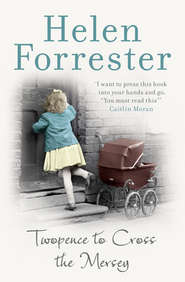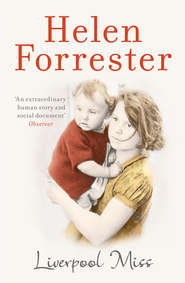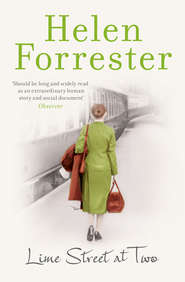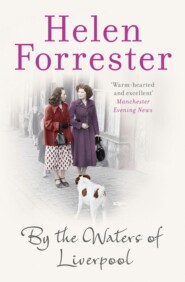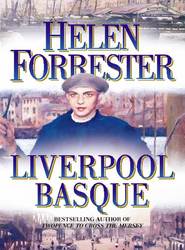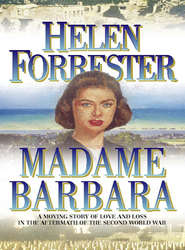По всем вопросам обращайтесь на: info@litportal.ru
(©) 2003-2024.
✖
The Complete Helen Forrester 4-Book Memoir: Twopence to Cross the Mersey, Liverpool Miss, By the Waters of Liverpool, Lime Street at Two
Настройки чтения
Размер шрифта
Высота строк
Поля
There ought to be a special medal for understanding teachers. I do not know what prompted the small, perfumed occupant of the teacher’s podium to come down from her perch, put her arm around my shoulders, regardless of the fact that I was obviously verminous, and say sweetly, ‘Do you want to take bookkeeping, too, my dear?’
She was taken aback visibly when I answered her in my clearest English – she must have expected a strong Liverpool accent
‘I had hoped to learn arithmetic, ma’am. Do you teach it?’
She recovered herself and guided me to an unoccupied double desk at the front of the class, as she replied.
‘No. This school has only commercial courses – it is assumed that you will have done the necessary arithmetic already in day-school.’
The other children were again staring at me, and she turned to them and said sharply, ‘Please fill in the forms I have given to you. I will take them in in a few minutes.’ She turned back to me. ‘Now,’ she said, ‘what kind of arithmetic do you want to learn?’
I explained my lack of algebra, that my academic training had come to an end at a chapter called ‘Compound Interest’, and that was as much as I knew.
She sat casually on the desk in front of me and looked me over thoughtfully.
‘When did you leave school?’ she asked.
I explained about leaving school when I was twelve and the subsequent glorious six weeks I had enjoyed just before my fourteenth birthday, and about Edward and Avril and the family.
‘I see,’ she said, drawing her pale blue cardigan more tightly around her. ‘Do you want to train for any particular occupation?’
An occupation seemed so far away, so unattainable, that I said hastily, ‘I have not thought of anything special – except that I would like to be able to help the hungry, unemployed people round me.’
She smiled at this and suggested, after some consideration, that I should take the standard commercial course, in which she taught bookkeeping. In addition, she would guide me through a basic course in arithmetic and algebra, which I could do as part of my homework.
‘If you take the commercial course, it will form a basis for several different ways of earning a living,’ she said practically.
I agreed because it seemed that I had no choice and, at least, she had opened a tiny door of hope for me. Yesterday there had been no hope; today there was a faint gleam.
She lent me her pen and I filled in the form she gave me, while the other members of the class handed theirs in, had them checked and were told to report back two nights later to commence their instruction.
When the classroom had emptied, I went to the teacher’s desk and handed in my form.
‘Fine,’ she said cheerfully. ‘Now, that will be half a crown; and here is a list of books you will need. They will cost about ten and sixpence.’
I was stunned. My tiny hope door slammed shut. I managed to gasp out, ‘I did not know there was a fee for evening school – I thought it was like elementary day-school – provided by the city – so – so I haven’t brought any money.’
The amounts were so small; but they might just as well have been hundreds of pounds, because I did not have them.
The teacher was collecting her papers, and she replied, without looking up, ‘Well, never mind. Ask your mother to give you the fee for next time – and you can get the books from any bookshop sometime during the week. Now, be here on Thursday at 7.30, remember.’
‘Yes, ma’am,’ I said heavily. ‘Good night – and thank you.’
I turned and marched out.
As soon as I was outside the school, I rushed to a corner behind a buttress of the building where the street lamps’ rays did not penetrate, and, putting my face against the damp, red bricks of the wall, I cried hopelessly and helplessly until not another tear would come. I cried from the frightful pent-up tension of yesterday and the disappointment and humiliation of today. I cried because I was drifting helplessly on a sea of life for which I had not been prepared and which I did not understand. I cried for the perfect peace and safe refuge of my grandmother’s house by the sea. I cried because I could not cross the Mersey to reach the green fields and wild seashores I loved.
Frozen and exhausted, I stuffed my blue hands into my cardigan pockets and turned towards home.
I took two steps and stopped. In my pocket was a hard little card. Mother’s library card!
Books! Perhaps the library had the books I needed. If they had, I could keep on reborrowing them, I argued. If it was not yet nine o’clock, I could run to the library and look.
I tore through the streets, taking shortcuts through every alleyway I could, regardless of danger. Dogs barked and cats and rats scampered away at the sound of my thudding feet.
I squeezed into the library’s muggy warmth five minutes before closing-time, the list of books clutched in one hand.
Feverishly, I sought through the index. Had they got them? Had they?
They had.
A few minutes later, I emerged, equipped with text-books.
At home I poured out my adventures to Alan and Fiona. It was a long time since I had had such a conversation with any of the family, and they were jubilant about the enrolment and the books. Alan offered to lend me his pen each evening.
‘If you don’t remind them, perhaps they’ll forget that you owe them half a crown,’ he said hopefully, in reference to the school fee.
‘They will have to,’ I said woodenly, ‘because I am going to school, no matter what happens.’
Brave words, but I still needed at least one notebook, and, as I put the family to bed, I worried more about obtaining twopence to buy a notebook than I worried about the half-crown.
On Wednesday, I found a piece of comb in a gutter and painfully attacked my tangled mop of hair with it Mother had a tiny pocket-comb, which of a necessity she had kept for herself, because she could not make herself neat for work if the precious object was broken. Father was fortunately almost bald. The children went uncombed and, mostly, unwashed, until more regular work enabled Mother to buy a strong comb for use by the family.
If ever I became rich, I told myself savagely, I would help to provide a basic kit for the more unfortunate of this world. It would consist of a large bar of kitchen soap, a pile of old white cloth, a pile of newspapers (newspapers can be made into beds, handkerchiefs, toilet-paper, warm padding under thin garments, draught excluders, makeshift window-pane replacements, firing, and a thousand other uses), some razor blades, for beards and nails, and a comb. One has to be without such small amenities to appreciate their worth.
My appearance was not much improved when I again presented myself at school, quailing at the thought of not being able to pay the fee.
The bookkeeping teacher was as kind as before and, after she had given the class some work to do, she brought over to me a small arithmetic textbook, told me to take it home, read the instructions in the first chapter and see if I could work my way through the problems based on them. She promised to mark the work for me.
Several children had no notebooks, so she provided some paper both for their work and mine. I soon became absorbed in the struggle to make my sluggish brain work, and forgot the silent distaste with which my fellow students were treating me.
Halfway through the evening, the class was taken over by a thin, energetic teacher who was to instruct us in English grammar. She proved equally as friendly and as helpful as the bookkeeping teacher.
Evening school has a long tradition in Lancashire and all over the city classrooms were crowded with young people desirous of improving their education. Again I was following in the footsteps of the humble weavers about whom my old gentleman in the park had told me.
It was Fiona who, accidentally, let fall one evening the information to my parents that I had gone to evening school.
They were rightly angry that I had taken such action without consulting them and both stormed at me about it
It would have brought more wrath down upon my head if I had defended myself by saying that I had long since concluded that consultation was waste of time, so I just stated firmly, ‘I have been going to evening school and I’m going to continue going.’ I had nothing to lose but my chains.
‘Where did you get the money from?’ asked Mother suddenly, her voice full of suspicion.
I had to own up that I owed the Liverpool education committee two shillings and sixpence – and, worse still, I needed two shillings more for bookkeeping books and other notebooks.
This led to further recrimination, and, with unusual impudence, I asked, ‘Would you prefer that I stole it rather than owed it?’
Such insolence was so unlike me, that it brought my parents up short.






